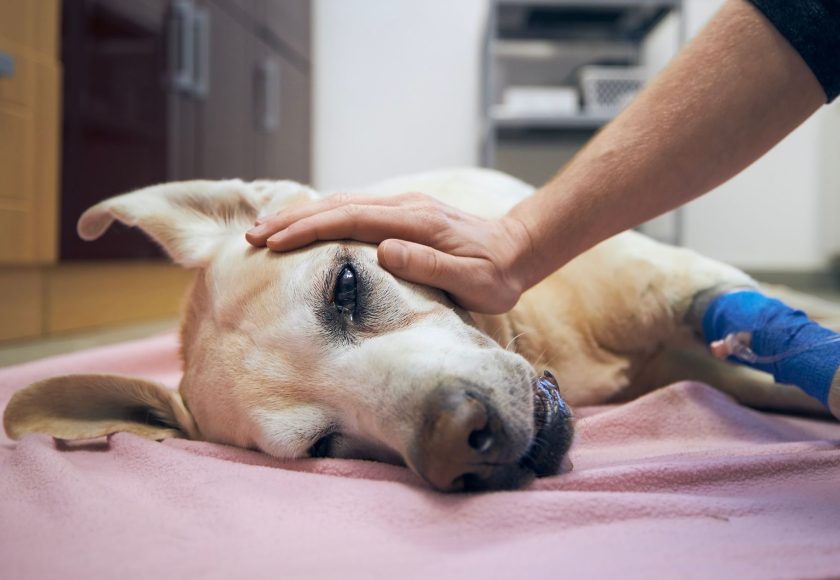Allergies to the environment or food in dogs are an increasingly common diagnosis in modern veterinary medicine. Allergies cause significant discomfort to both the pet and its owner, so diagnosis and proper treatment are very important.
Table of contents
What exactly is dog allergy?
An allergy is an excessive immune response or hypersensitivity of the body to a certain substance. Allergies can be caused not only by food products or meat/fish proteins, but also by environmental factors (e.g., dust mites, shampoos, detergents, cleaning products, and other household chemicals, pollen).
Most allergy-causing substances are found in plants, insects, other animals, and proteins in food. In the case of allergies, a dog’s immune response can be harmful to the animal’s own body. When this happens, the dog’s immune system causes the body to release histamines, which can cause inflammation, swelling, or itching. Therefore, it is always very important to first determine the cause of the dog’s allergy.

What are the symptoms and signs of dog allergies?
The symptoms that are visible to the dog owner depend greatly on the cause of the allergy. The most common signs of allergies in dogs observed by veterinarians are red and itchy skin between the toes, in the groin, armpits, head, muzzle, and ear areas, as well as rashes or skin swelling in the same areas of the dog’s body.
These skin changes lead to increased hair loss, and sometimes even bald patches in various areas of the body. Dogs with food or food product allergies often experience diarrhea, vomiting, and other gastrointestinal symptoms. Signs of environmental allergies in dogs often include sneezing, watery, itchy, red eyes, runny nose, coughing, and wheezing.
Anaphylactic shock – a particularly severe symptom of dog allergy
Anaphylactic shock is characterized by sudden swelling of the dog’s snout, difficulty breathing, discoloration of the mucous membranes, vomiting, diarrhea, fainting, and even sudden death if veterinary care is not provided in time.
This reaction to an allergen usually occurs after a bee or wasp sting, after eating a food to which the dog is highly allergic (e.g., peanut butter, etc.), or after receiving a vaccine or new medication.
If you notice even one sign of a particularly strong and severe allergy in your dog, contact your veterinarian immediately so that they can prescribe the appropriate treatment.
Dermatitis – a consequence of allergies in dogs
Dermatitis in dogs is a secondary skin inflammation that is most often the result of an allergy that has not been treated in time. In such cases, dogs need to be seen not only by an allergist, but also by a dermatologist.
Another common case of dog allergies in veterinary medicine is allergy to flea saliva. This is a dog allergy that causes dermatitis. Dogs suffering from dermatitis often rub, lick, chew, and scratch their legs, sides, ears, armpits, and groin, which can cause hair loss, redness or flaking of the skin, increased dryness, or oiliness.

Dog food allergies
As mentioned above, dog allergies most often manifest themselves in the form of skin or gastrointestinal symptoms. Dog food allergies most often manifest themselves in the form of skin redness, swelling, itching, hair loss, increased salivation, diarrhea, vomiting, and bloating.
Food allergies in dogs can develop at any age, regardless of whether the food or environment has been suitable for several years. An intensified reaction to an allergen can be triggered by age-related sensitivity or a weakened immune system during seasonal changes.
Often, dog allergies to food or food products are caused by meat protein in the food. However, with the advancement of veterinary diagnostic methods, allergies are increasingly being identified not only to meat protein, but also to additives in food (e.g., gluten, stabilizers, rice, corn, dairy products, etc.).
If you suspect that your dog has a food allergy, consult a veterinarian, dermatologist, or allergist. The first step in managing your dog’s allergy to food or food products is a strict elimination diet, which should be selected by a veterinarian based on the animal’s age and allergy symptoms.

Diagnosis of dog allergies
Diagnosing allergies in dogs is a process that requires a lot of patience and time. The first and most important step for a responsible owner is to choose a good specialist. Only a veterinary allergist can select the most appropriate diagnostic and treatment methods.
During the initial examination, if your pet is suspected of having an allergy, it is very important to rule out all other related diseases that may cause the same symptoms as allergies. It is important to perform a wide range of blood tests to rule out the possibility of diseases of the digestive tract, kidneys, liver, gallbladder, and pancreas, as well as to check for medications that have been used to treat parasites that can breed and live in the skin.
Once any disease or parasite has been ruled out for treatment purposes, the allergist will often prescribe an elimination veterinary diet to remove allergens from the dog’s food. If this type of diet is used and the desired results are not achieved, further tests are carried out. A blood sample is taken to look for environmental allergens.
Are there any medications for allergies in dogs?
Medications in the form of tablets, injections, and ointments are used to treat allergies in dogs.
Topical medications for dog allergies are most often used to locally reduce the dog’s discomfort, itching, and scratching. Injections and tablets are used to reduce the body’s reaction to the allergen. In many cases, both treatment methods are used together.
Allergies in dogs are incurable, but with the right treatment and diet (in the case of food allergies), it is possible to successfully regulate the body’s reaction to allergens and eliminate the symptoms and discomfort caused by allergies in dogs.
Only after a thorough diagnosis can a veterinary allergist select the most appropriate treatment method for a dog’s allergies.

When should you contact a veterinary clinic about your dog’s allergies?
If you notice that your dog is constantly scratching, becoming restless, having diarrhea, or vomiting, Begemotas Veterinary Medical Center will provide you with all the necessary therapist and specialist services.
Milda Vasaitytė, a dermatologist and allergist working at the Begemotas Veterinary Clinic in Vilnius, will not only examine your pet responsibly and perform all the necessary diagnostic tests, but will also prescribe treatment, provide advice, and answer any questions you may have about raising, feeding, and caring for an allergic dog.
The Begemotas Veterinary Clinic in Vilnius uses the most modern diagnostic and innovative treatment methods for dog allergies. If your dog suffers from allergies, please contact our team and register your pet for a health check-up.





